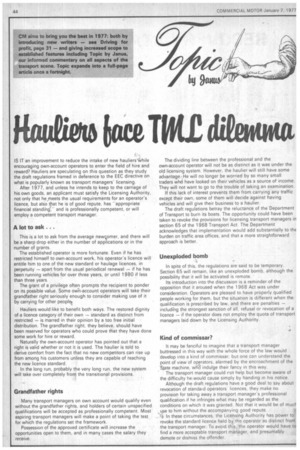Haim (lace MCC ditewmut
Page 46

If you've noticed an error in this article please click here to report it so we can fix it.
IS IT an improvement to reduce the intake of new hauliers'While encouraging own-account operators to enter the field of hire and reward? Hauliers are speculating on this question as they study the draft regulations framed in deference to the EEC directive on what is popularly known as transport managers' licensing.
After 1977, and unless he intends to keep to the carriage of his own goods, an applicant must satisfy the Licensing Authority, not only that he meets the usual requirements for an operator's licence, but also triat he is of good repute. has -appropriate financial standing',and is professionally competent, or will employ a competent transport manager.
A lot to ask. . .
This is a lot to ask from the average newcomer, and there will be a sharp drop either in the number of applications or in the number of grants.
The established operator is more fortunate. Even if he has restricted himself to own-account work, his operator's licence will entitle him to one of the new standard or haulage licences, in perpetuity — apart from the usual periodical renewal — if he has been running vehicles for over three years, or until 1980 if less than three years.
The grant of a privilege often prompts the recipient to ponder on its possible value. Some own-account operators will take their grandfather right seriously enough to consider making use of it by carrying for other peoplet..
Hauliers would like to benefit both ways. The restored dignity of a licence category of their own -standard as distinct from restricted — is marred in their opinion by a too free initial distribution. The grandfather right, they believe, should have been reserved for operators who could prove that they have done some work for hire or reward.
Naturally the own-account operator has pointed out that a right is valid whether or not it is used. The haulier is told to derive comfort from the fact that no new competitors can rise up from among his customers unless they are capable of reaching the new licence standard.
In the long run, probably the very long run, the new system will take over completely from the transitional provisions.
Grandfather rights
Many transport managers on own account would qualify even without the grandfather rights, and holders of certain unspecified qualifications will be accepted as professionally competent. Most aspiring transport managers will make a point of taking the test for which the regulations set the framework.
Possession of the approved certificate will increase the opportunities open to them, and in many cases the salary they receive. The dividing line between the professional and the own-account operator will not be as distinct as it was under the old licensing system However, the haulier will still have some advantage..-,He will no longer be worried by so many small traders whd have looked on their vehicles as a source of income. They will not want to go to the trouble of taking an examination.
If this lack of interest prevents them from carrying any traffic except their own, some of them will decide against having vehicles and will give their business to a haulier.
The draft regulations betray the reluctance of the Department of Transport to burn its boats. The opportunity could have been taken to revoke the provisions for licensing transport managers in section 65 of the 1968 Transport Act, The Department acknowledges that implementation would add substantially to the burden on traffic area offices, and that a more straightforward approach is better.
Unexploded bomb
In spite of this, the regulations are said to be temporary. Section 65 will remain, like an unexploded bomb, although the possibility that it will be activated is remote.
Its introduction into the discussion is a reminder of the opposition that it aroused when the 1968 Act was under consideration. Operators are pleased to have properly qualified people working for them, but the situation is different when the qualification is prescribed by law, and there are penalties -including the strongest sanction of all, refusal or revocation of a licence — if the operator does not employ the quota of transport managers laid down by the Licensing Authority.
Kind of commissar?
It may be fanciful to imagine that a transport manager buttressed in this way with the whole force of the law would develop into a kind of commissar: but one can understand the point of view of operators, alarmed by the encroachment of the State machine, whd indulge their fancy in this way.
The transport manager could rot help but become aware of the difficulty he would cause simply by handing in his notice.
Although the draft regulations have a good deal to say about revocation of standaid operators' licences, they make no provision for taking away a transport manager's professional qualification if he infringes what may be regarded as the conditions on which it was granted. Not that it would be of much use to him without the accompanying good repute.
In these circumstances, the Licensing Authority has power to revoke the standard licence held by the operator as distinct from the transport manager. To avoid this, the operator would have to find a more acceptable transport manager, and presumably demote or dismiss the offender.




















































































